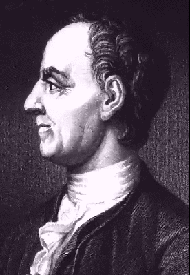Biography |

Born in 1707, Leonhard Euler was the son of a Protestant minister from the vicinity of Basel, Switzerland. With the aim of pursuing a career in theology, Euler entered the University of Basel at the age of thirteen, where he was tutored in mathematics by Johann Bernoulli (of the famous Bernoulli family of mathematicians). He developed an interest in mathematics, which consequently led him to abandon his plans to follow in his fatherís footsteps. |
At the age of 16, Euler completed a master’s degree in Philosophy and, in 1727, Peter the Great invited Euler to join the Academy of Sciences in St. Petersburg, where he became a Professor of Physics in 1730, and a Professor of Mathematics in 1733 - the same year he married Catherina Gsell. In 1741, at the invitation of Frederick II, Euler became director of Mathematics and Physics at the Royal Academy of Berlin, but after a disagreement with Fredrick, he returned to the Academy in St. Petersburg in 1766, on inviation of Catherine the Great. |
Euler was incredibly prolific, writing more than 700 books and papers. His papers accumulated at such a rapid rate that he left a pile of papers to be published by the Academy. However, they published the top papers first so that later results were published before the results they superseded |

or depended on. This unusual productivity continued throughout the last twelve years of his life when he was entirely blind (as a consequence of not taking necessary care of himself after a cataract operation). Incredibly, after his return to St. Petersburg, Euler produced almost half of his total works. Euler also had thirteen children, only five of which survived, and was able to continue his research while a child or two bounced on his knees. He has been quoted as saying that he made some of his greatest discoveries while holding a baby in his arms. On September 18th in 1783, Euler died from a brain haemorrhage not long after giving one of his grandchildren a mathematics lesson. He left so much unpublished work that the Academy did not finish publication of his work for forty-seven years after his death. The publication of the collected works and letters of Euler, the Opera Omnia, by the Swiss Academy of Sciences will require more than eighty-five large volumes of which seventy-six have already been published (as of late 1999). |
Click on the globe to see a birth-place map: |
|
1707 - 1783
|